
Agent
RustSBI Specialized Domain Knowledge Quiz LLM
Stars: 101
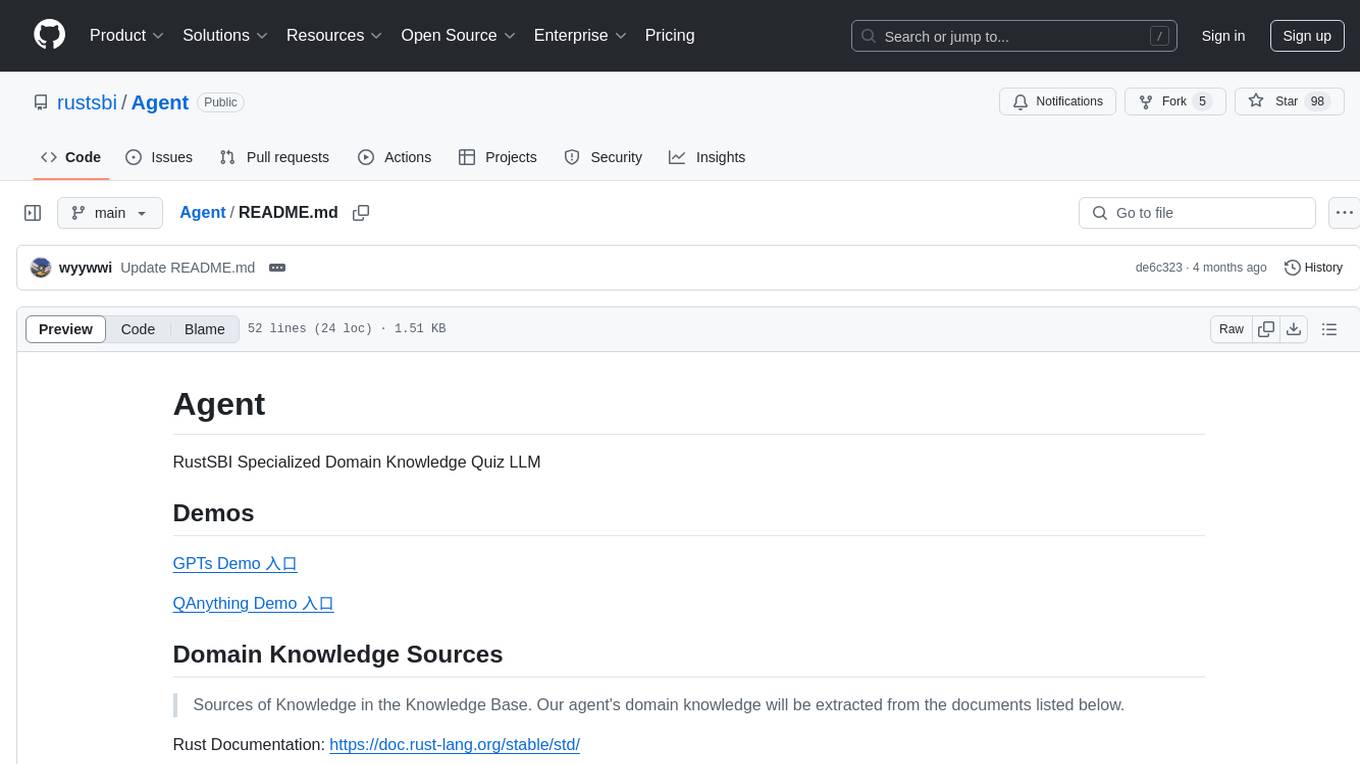
Agent is a RustSBI specialized domain knowledge quiz LLM tool that extracts domain knowledge from various sources such as Rust Documentation, RISC-V Documentation, Bouffalo Docs, Bouffalo SDK, and Xiangshan Docs. It also provides resources for LLM prompt engineering and RAG engineering, including guides and existing projects related to retrieval-augmented generation (RAG) systems.
README:
RustSBI Specialized Domain Knowledge Quiz LLM
Sources of Knowledge in the Knowledge Base. Our agent's domain knowledge will be extracted from the documents listed below.
Rust Documentation: https://doc.rust-lang.org/stable/std/
RISC-V Documentation: https://github.com/riscv/riscv-isa-manual
Bouffalo Docs: https://github.com/bouffalolab/bl_docs
Bouffalo SDK: https://github.com/bouffalolab/bouffalo_sdk
Xiangshan Docs: https://github.com/openxiangshan/xiangshan
Introduction to Prompt Engineering, including documentation and high-quality articles.
Prompt Engineering Guide: https://www.promptingguide.ai/zh
Prompt Engineering Tools: https://learnprompting.org/docs/tooling/tools
Introduction to RAG Engineering, including documentation and high-quality articles.
RAG Beginner's Guide (Chinese): https://53ai.com/news/RAG/2024081636147.html
RAG Beginner's Guide (English): https://www.singlestore.com/blog/a-guide-to-retrieval-augmented-generation-rag/
Existing projects about RAG.
Easy-RAG: A RAG system implementation
RAGFlow: Another RAG implementation
For Tasks:
Click tags to check more tools for each tasksFor Jobs:
Alternative AI tools for Agent
Similar Open Source Tools

Agent
Agent is a RustSBI specialized domain knowledge quiz LLM tool that extracts domain knowledge from various sources such as Rust Documentation, RISC-V Documentation, Bouffalo Docs, Bouffalo SDK, and Xiangshan Docs. It also provides resources for LLM prompt engineering and RAG engineering, including guides and existing projects related to retrieval-augmented generation (RAG) systems.
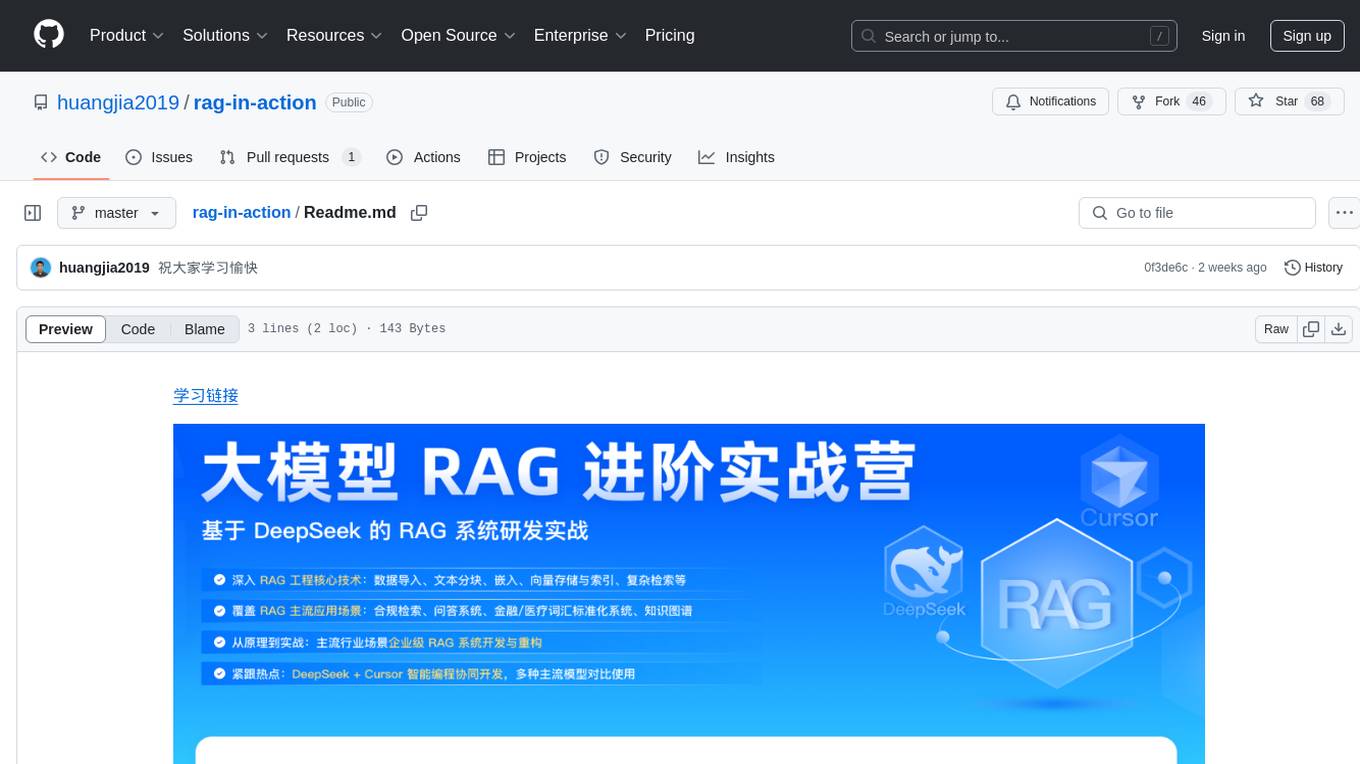
rag-in-action
rag-in-action is a GitHub repository that provides a practical course structure for developing a RAG system based on DeepSeek. The repository likely contains resources, code samples, and tutorials to guide users through the process of building and implementing a RAG system using DeepSeek technology. Users interested in learning about RAG systems and their development may find this repository helpful in gaining hands-on experience and practical knowledge in this area.
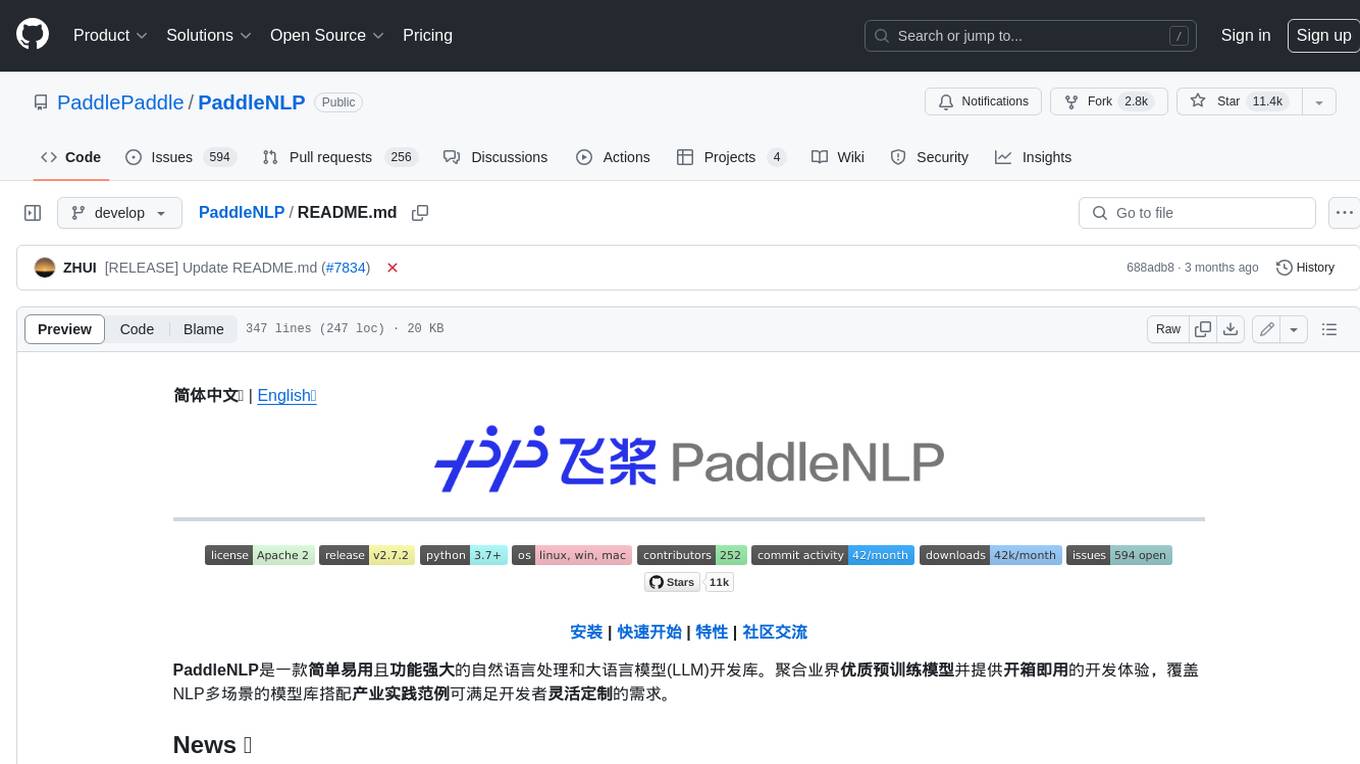
PaddleNLP
PaddleNLP is an easy-to-use and high-performance NLP library. It aggregates high-quality pre-trained models in the industry and provides out-of-the-box development experience, covering a model library for multiple NLP scenarios with industry practice examples to meet developers' flexible customization needs.
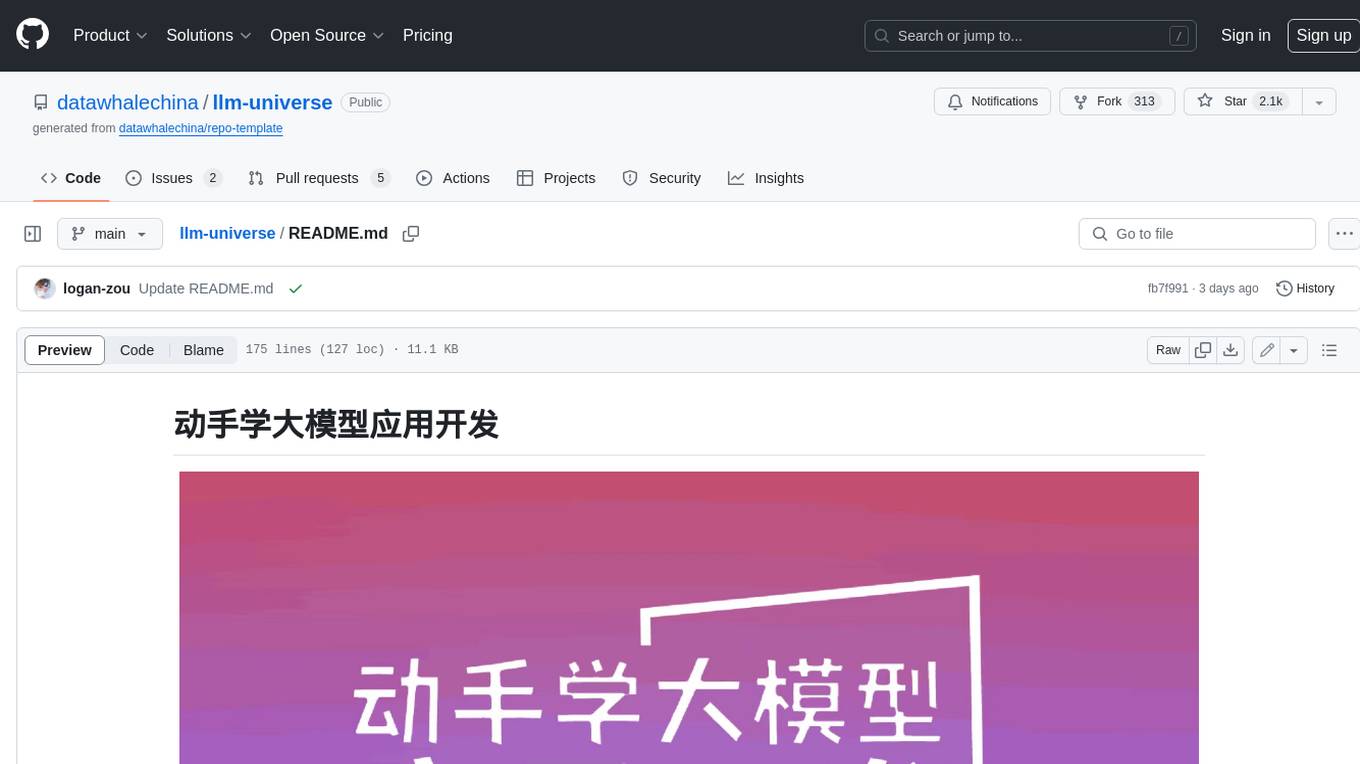
llm-universe
This project is a tutorial on developing large model applications for novice developers. It aims to provide a comprehensive introduction to large model development, focusing on Alibaba Cloud servers and integrating personal knowledge assistant projects. The tutorial covers the following topics: 1. **Introduction to Large Models**: A simplified introduction for novice developers on what large models are, their characteristics, what LangChain is, and how to develop an LLM application. 2. **How to Call Large Model APIs**: This section introduces various methods for calling APIs of well-known domestic and foreign large model products, including calling native APIs, encapsulating them as LangChain LLMs, and encapsulating them as Fastapi calls. It also provides a unified encapsulation for various large model APIs, such as Baidu Wenxin, Xunfei Xinghuo, and Zh譜AI. 3. **Knowledge Base Construction**: Loading, processing, and vector database construction of different types of knowledge base documents. 4. **Building RAG Applications**: Integrating LLM into LangChain to build a retrieval question and answer chain, and deploying applications using Streamlit. 5. **Verification and Iteration**: How to implement verification and iteration in large model development, and common evaluation methods. The project consists of three main parts: 1. **Introduction to LLM Development**: A simplified version of V1 aims to help beginners get started with LLM development quickly and conveniently, understand the general process of LLM development, and build a simple demo. 2. **LLM Development Techniques**: More advanced LLM development techniques, including but not limited to: Prompt Engineering, processing of multiple types of source data, optimizing retrieval, recall ranking, Agent framework, etc. 3. **LLM Application Examples**: Introduce some successful open source cases, analyze the ideas, core concepts, and implementation frameworks of these application examples from the perspective of this course, and help beginners understand what kind of applications they can develop through LLM. Currently, the first part has been completed, and everyone is welcome to read and learn; the second and third parts are under creation. **Directory Structure Description**: requirements.txt: Installation dependencies in the official environment notebook: Notebook source code file docs: Markdown documentation file figures: Pictures data_base: Knowledge base source file used
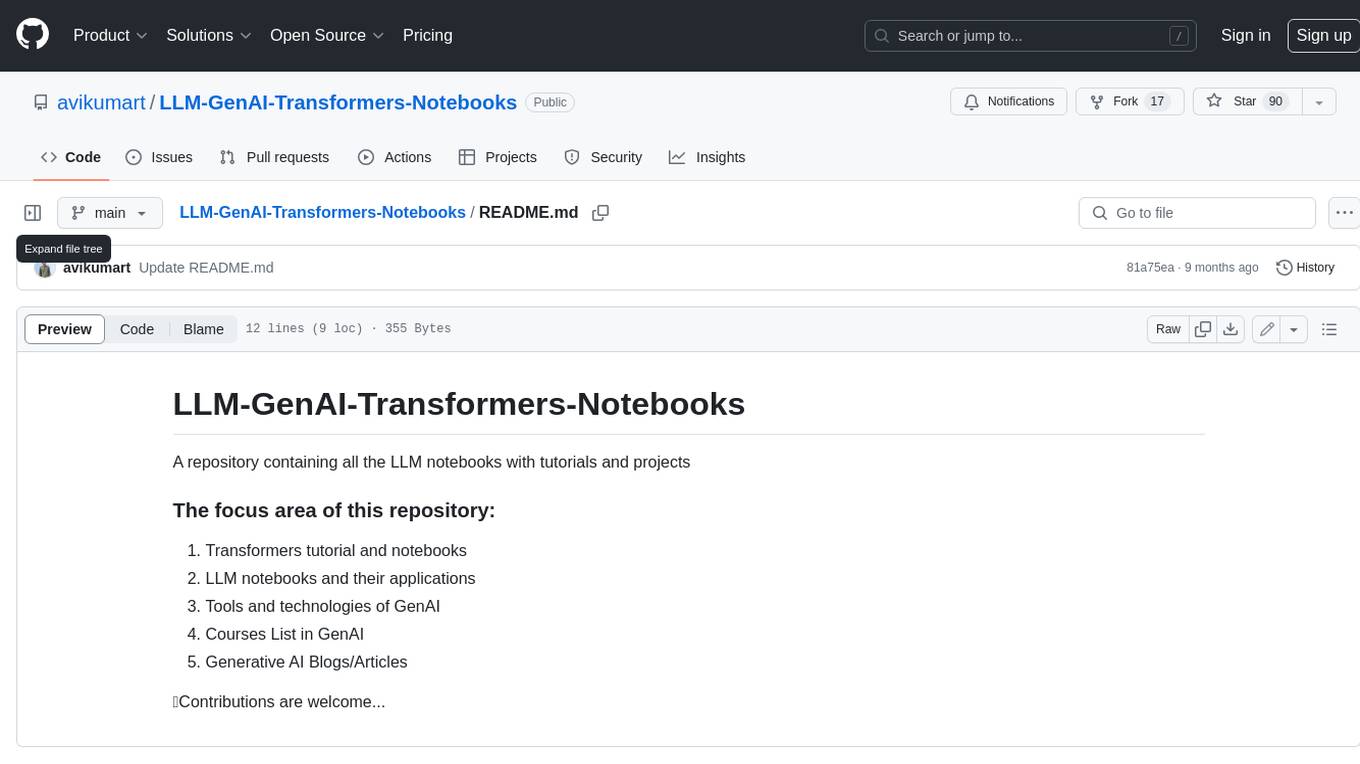
LLM-GenAI-Transformers-Notebooks
This repository is a collection of LLM notebooks with tutorials and projects. It covers topics such as Transformers tutorials, LLM notebooks and their applications, tools and technologies of GenAI, courses in GenAI, and Generative AI blogs/articles. Contributions are welcome.
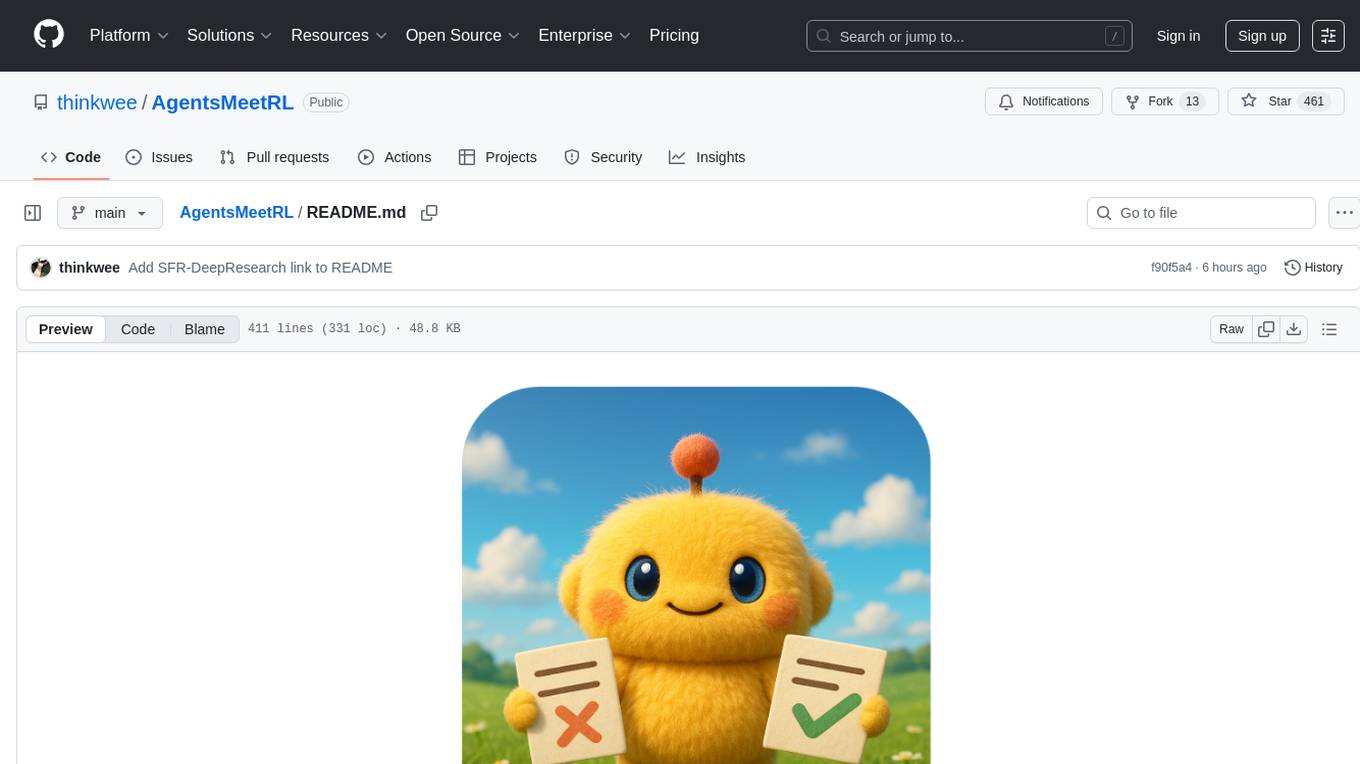
AgentsMeetRL
AgentsMeetRL is an awesome list that summarizes open-source repositories for training LLM Agents using reinforcement learning. The criteria for identifying an agent project are multi-turn interactions or tool use. The project is based on code analysis from open-source repositories using GitHub Copilot Agent. The focus is on reinforcement learning frameworks, RL algorithms, rewards, and environments that projects depend on, for everyone's reference on technical choices.
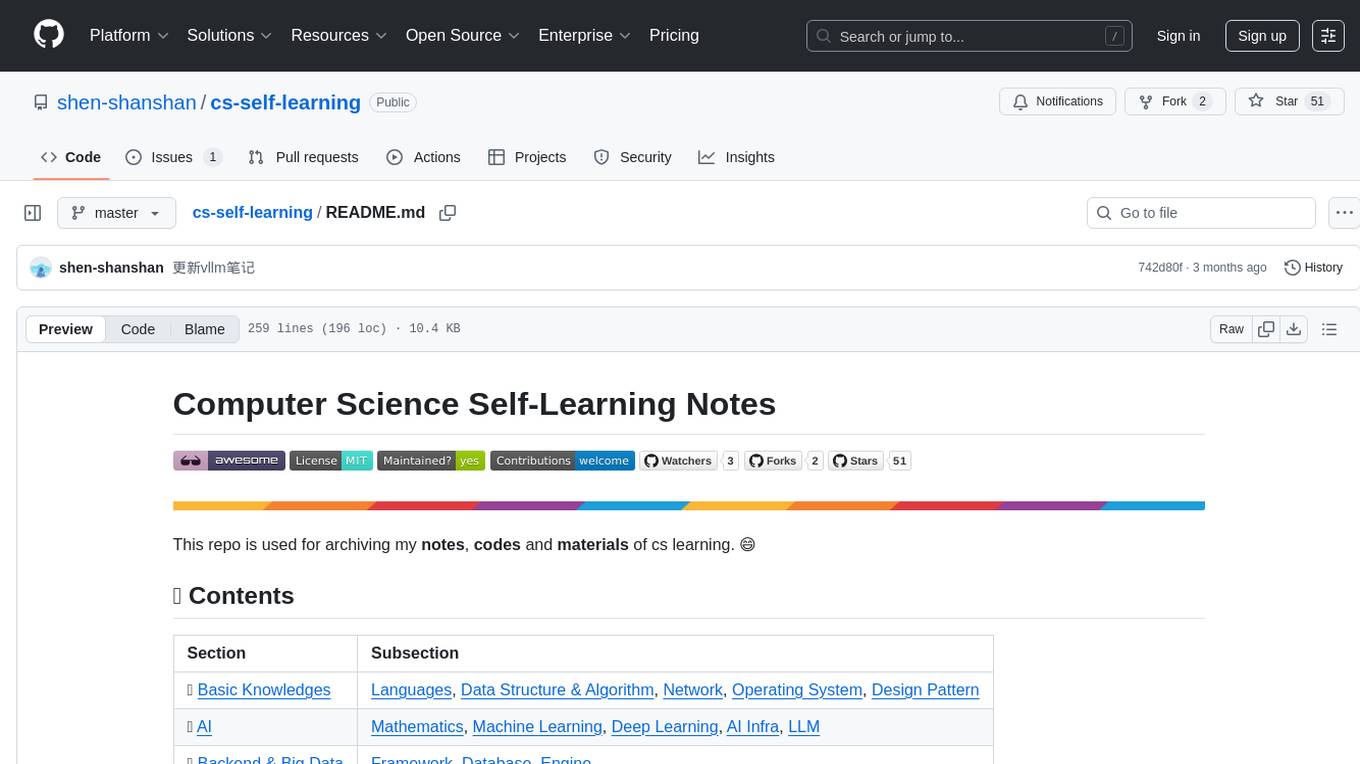
cs-self-learning
This repository serves as an archive for computer science learning notes, codes, and materials. It covers a wide range of topics including basic knowledge, AI, backend & big data, tools, and other related areas. The content is organized into sections and subsections for easy navigation and reference. Users can find learning resources, programming practices, and tutorials on various subjects such as languages, data structures & algorithms, AI, frameworks, databases, development tools, and more. The repository aims to support self-learning and skill development in the field of computer science.
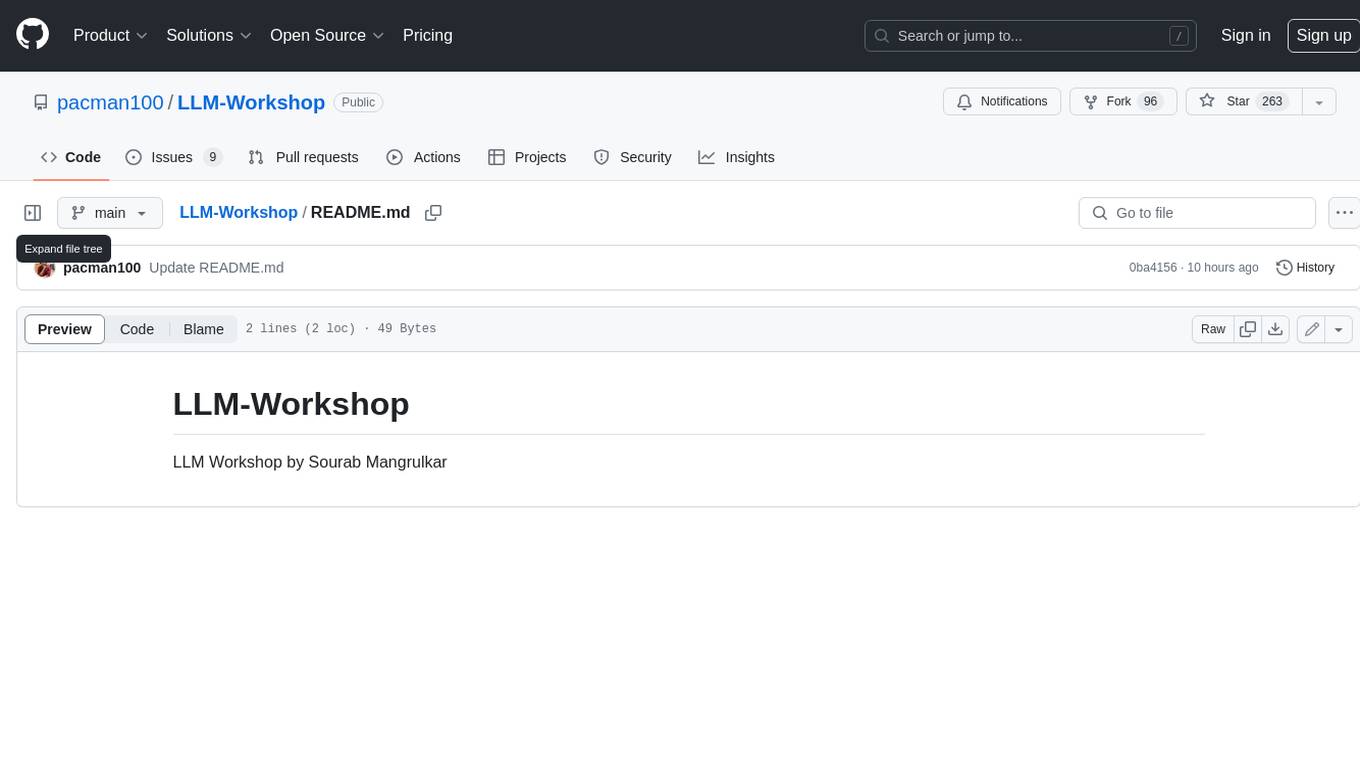
LLM-Workshop
This repository contains a collection of resources for learning about and using Large Language Models (LLMs). The resources include tutorials, code examples, and links to additional resources. LLMs are a type of artificial intelligence that can understand and generate human-like text. They have a wide range of potential applications, including natural language processing, machine translation, and chatbot development.
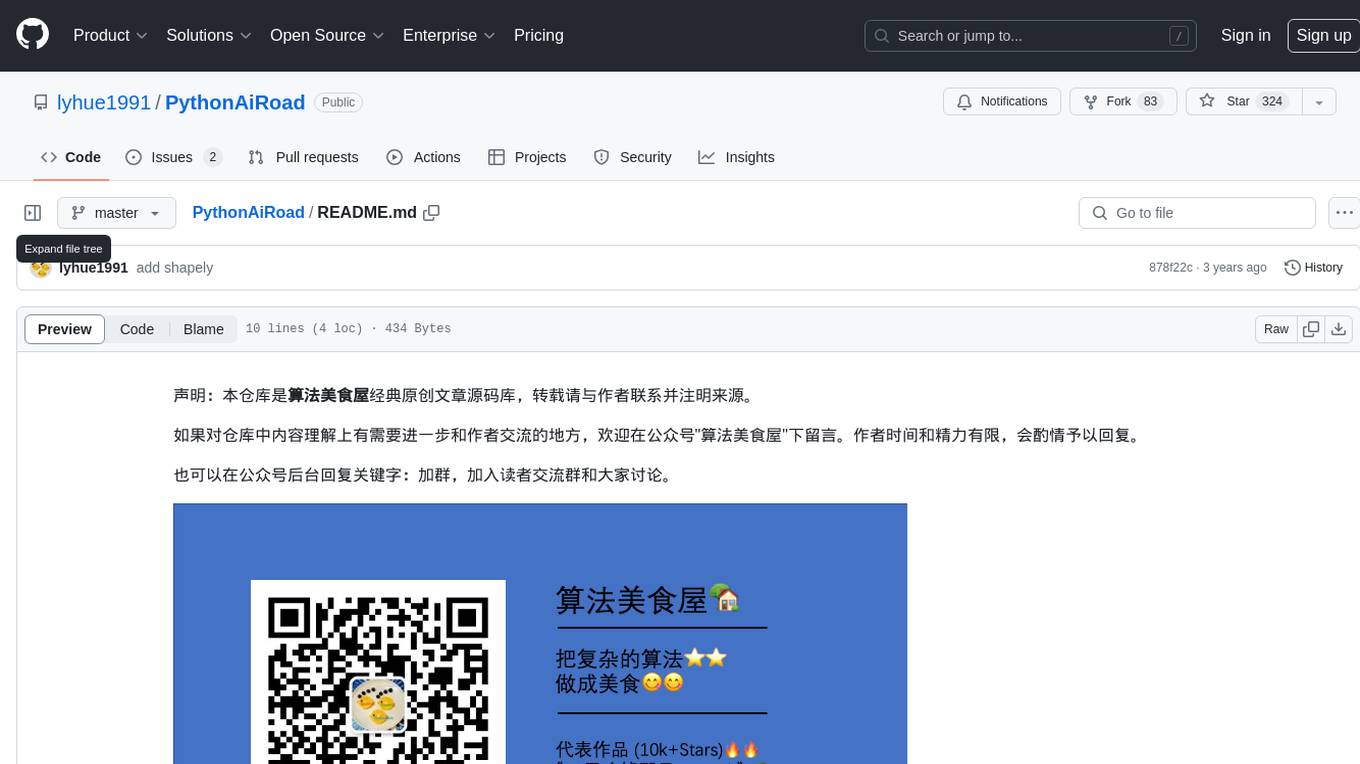
PythonAiRoad
PythonAiRoad is a repository containing classic original articles source code from the 'Algorithm Gourmet House'. It is a platform for sharing algorithms and code related to artificial intelligence. Users are encouraged to contact the author for further discussions or collaborations. The repository serves as a valuable resource for those interested in AI algorithms and implementations.
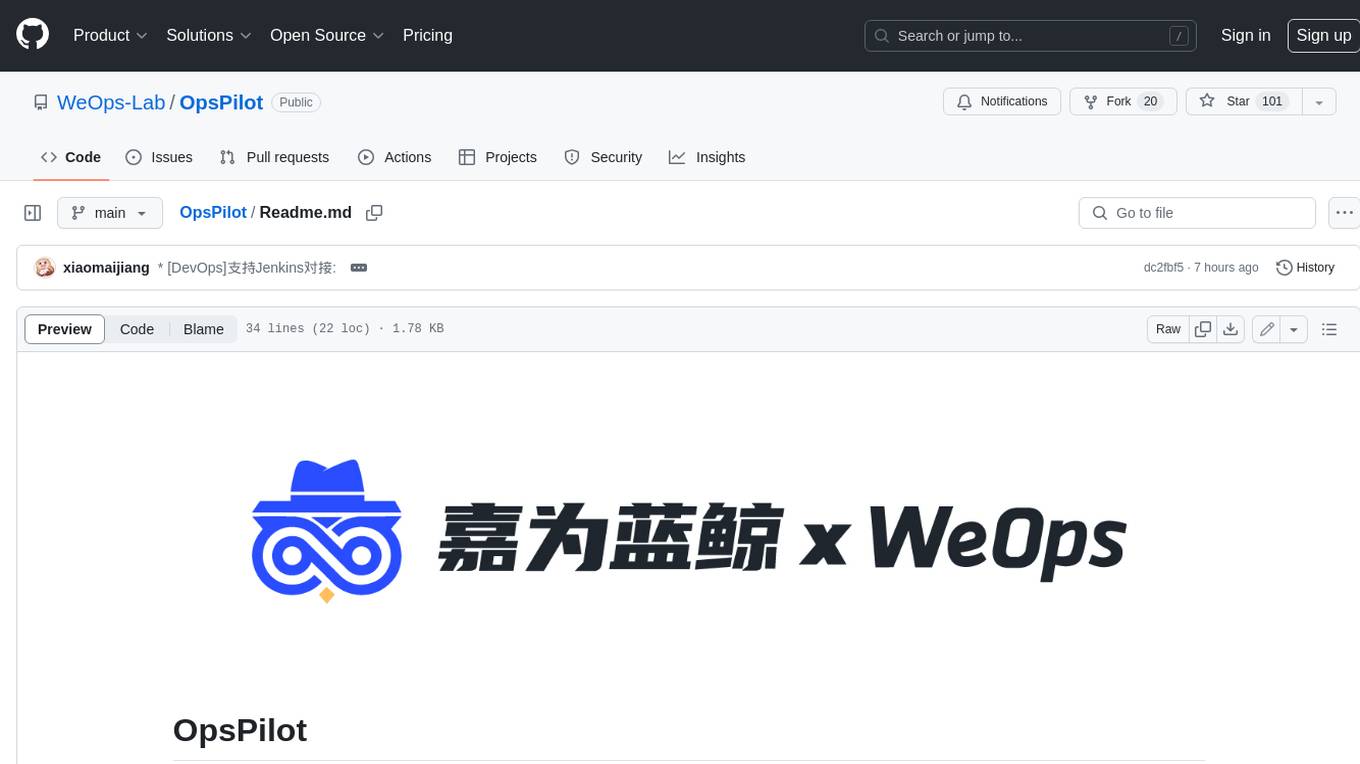
OpsPilot
OpsPilot is an AI-powered operations navigator developed by the WeOps team. It leverages deep learning and LLM technologies to make operations plans interactive and generalize and reason about local operations knowledge. OpsPilot can be integrated with web applications in the form of a chatbot and primarily provides the following capabilities: 1. Operations capability precipitation: By depositing operations knowledge, operations skills, and troubleshooting actions, when solving problems, it acts as a navigator and guides users to solve operations problems through dialogue. 2. Local knowledge Q&A: By indexing local knowledge and Internet knowledge and combining the capabilities of LLM, it answers users' various operations questions. 3. LLM chat: When the problem is beyond the scope of OpsPilot's ability to handle, it uses LLM's capabilities to solve various long-tail problems.
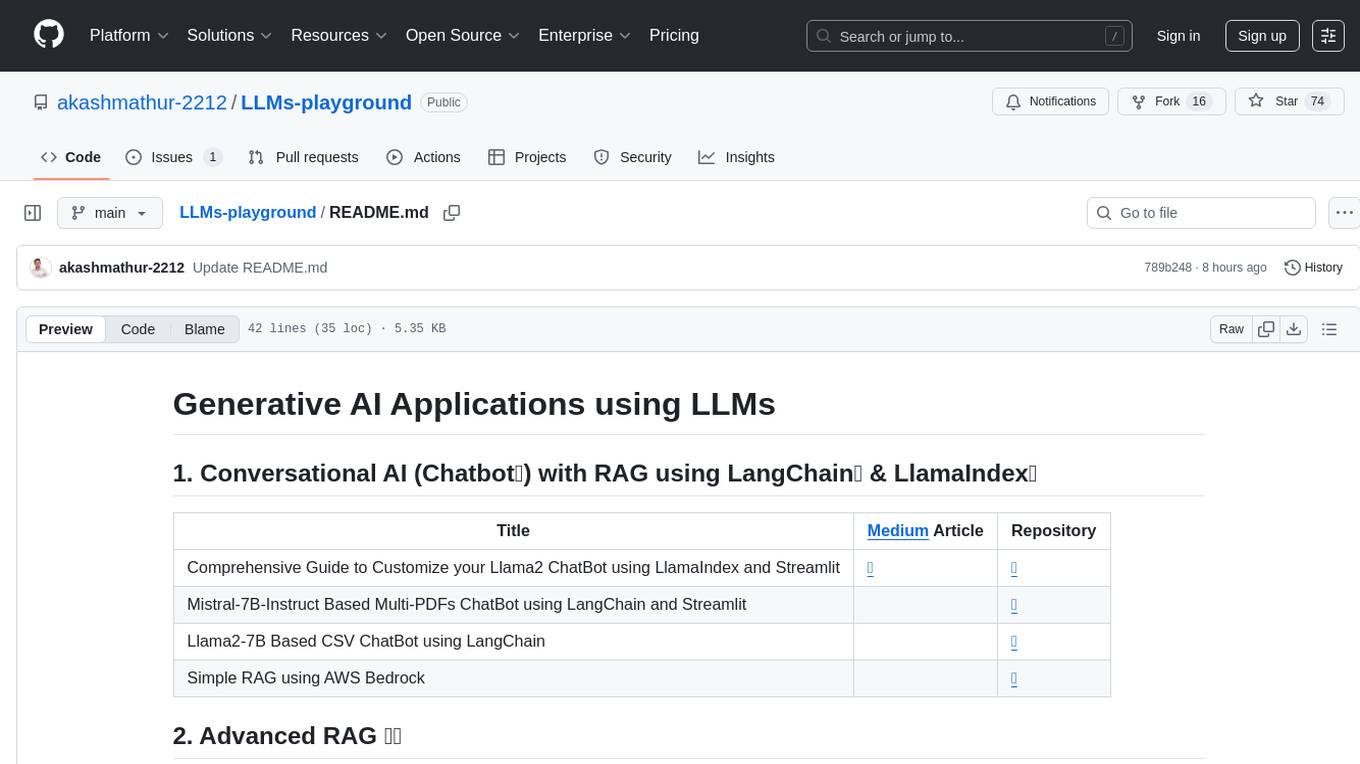
LLMs-playground
LLMs-playground is a repository containing code examples and tutorials for learning and experimenting with Large Language Models (LLMs). It provides a hands-on approach to understanding how LLMs work and how to fine-tune them for specific tasks. The repository covers various LLM architectures, pre-training techniques, and fine-tuning strategies, making it a valuable resource for researchers, students, and practitioners interested in natural language processing and machine learning. By exploring the code and following the tutorials, users can gain practical insights into working with LLMs and apply their knowledge to real-world projects.
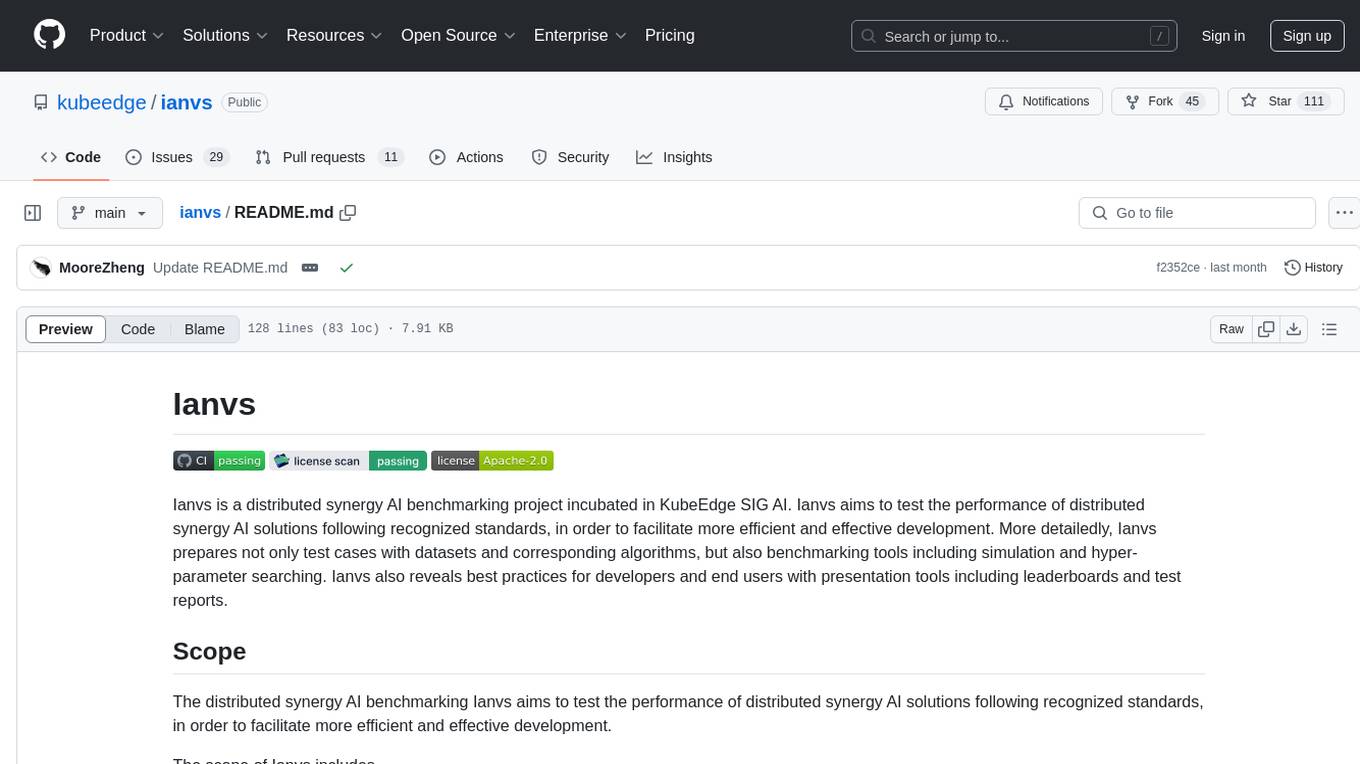
ianvs
Ianvs is a distributed synergy AI benchmarking project incubated in KubeEdge SIG AI. It aims to test the performance of distributed synergy AI solutions following recognized standards, providing end-to-end benchmark toolkits, test environment management tools, test case control tools, and benchmark presentation tools. It also collaborates with other organizations to establish comprehensive benchmarks and related applications. The architecture includes critical components like Test Environment Manager, Test Case Controller, Generation Assistant, Simulation Controller, and Story Manager. Ianvs documentation covers quick start, guides, dataset descriptions, algorithms, user interfaces, stories, and roadmap.
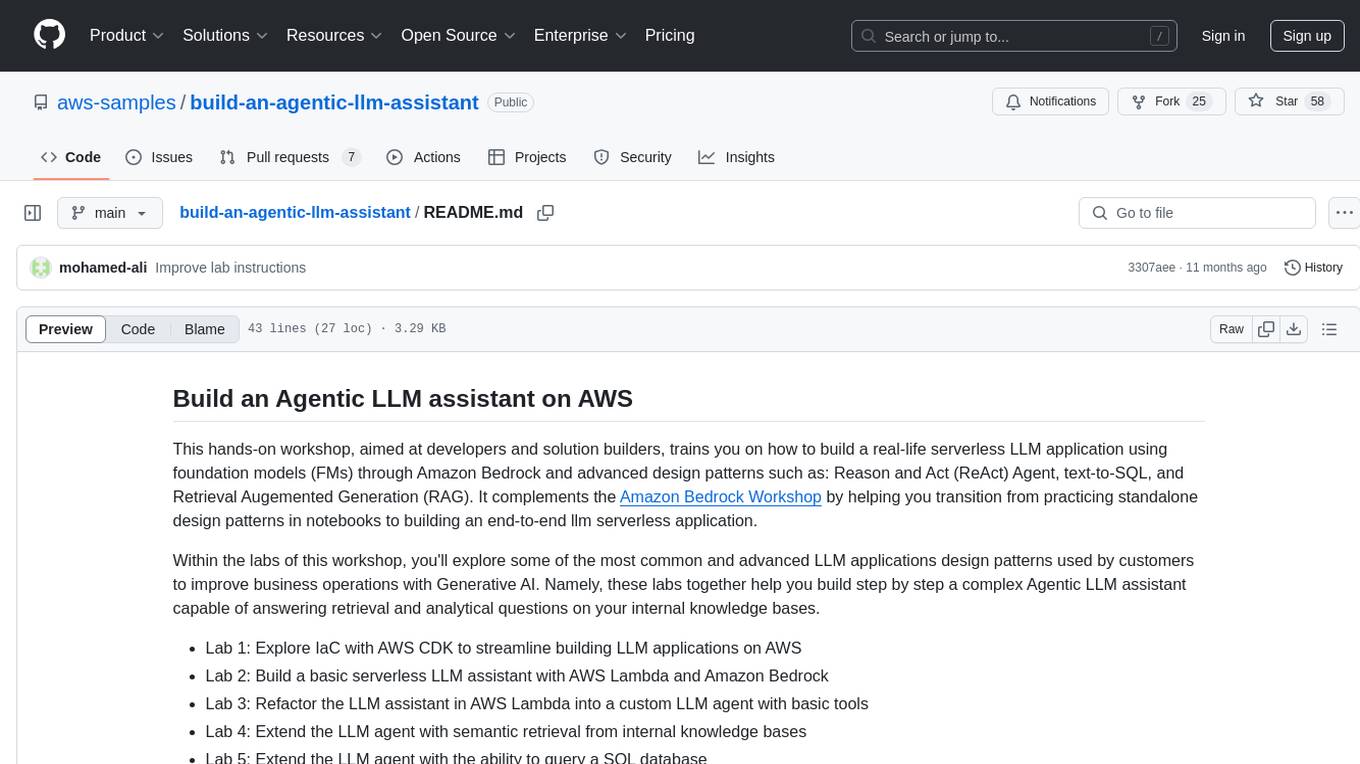
build-an-agentic-llm-assistant
This repository provides a hands-on workshop for developers and solution builders to build a real-life serverless LLM application using foundation models (FMs) through Amazon Bedrock and advanced design patterns such as Reason and Act (ReAct) Agent, text-to-SQL, and Retrieval Augmented Generation (RAG). It guides users through labs to explore common and advanced LLM application design patterns, helping them build a complex Agentic LLM assistant capable of answering retrieval and analytical questions on internal knowledge bases. The repository includes labs on IaC with AWS CDK, building serverless LLM assistants with AWS Lambda and Amazon Bedrock, refactoring LLM assistants into custom agents, extending agents with semantic retrieval, and querying SQL databases. Users need to set up AWS Cloud9, configure model access on Amazon Bedrock, and use Amazon SageMaker Studio environment to run data-pipelines notebooks.
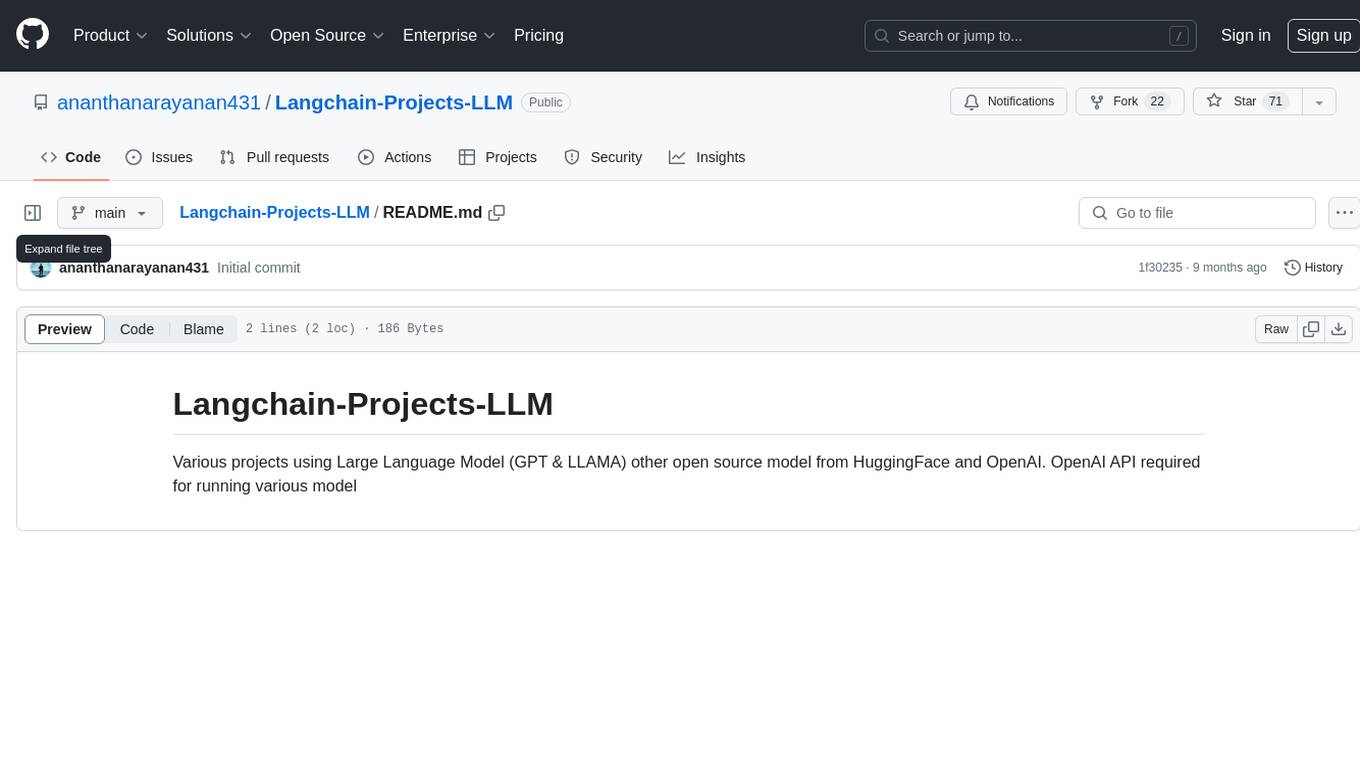
Langchain-Projects-LLM
Langchain-Projects-LLM is a repository containing various projects utilizing Large Language Models such as GPT and LLAMA from HuggingFace and OpenAI. Users need the OpenAI API to run these models.
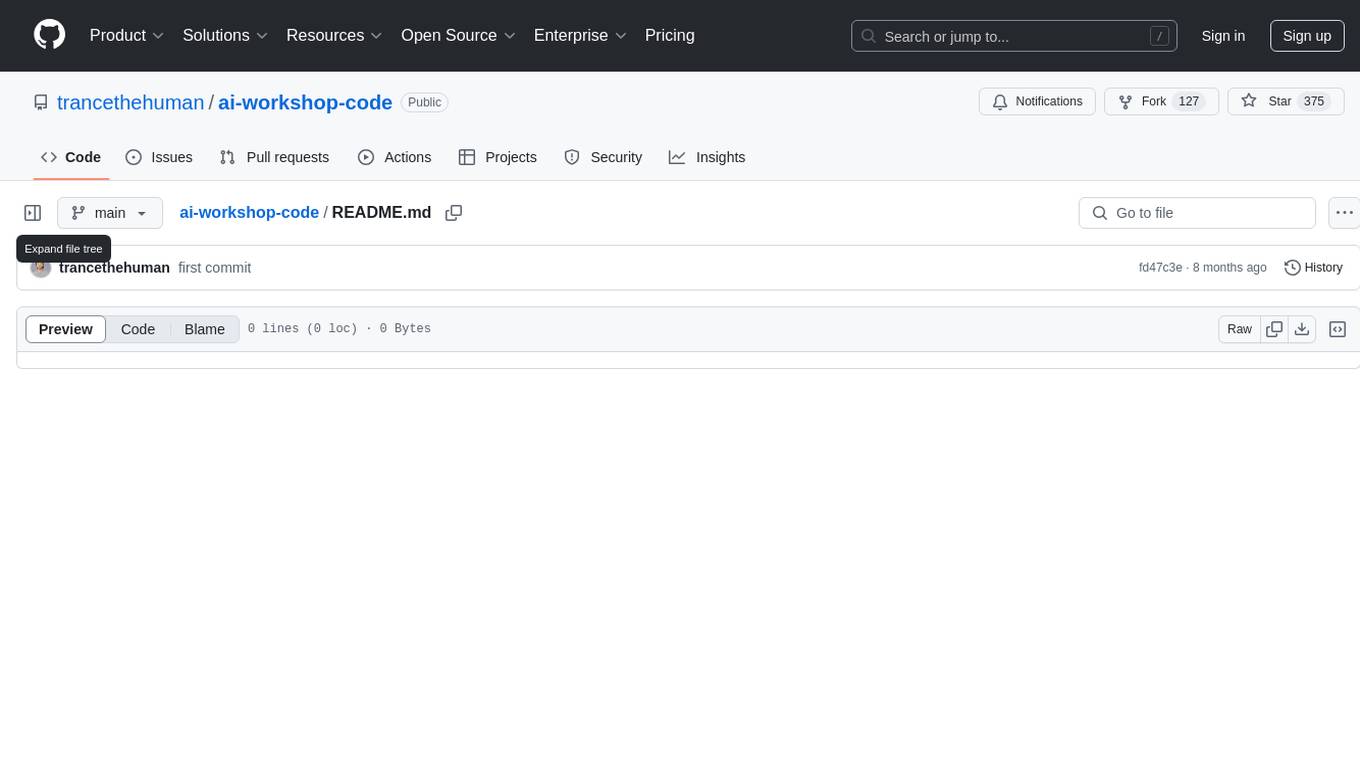
ai-workshop-code
The ai-workshop-code repository contains code examples and tutorials for various artificial intelligence concepts and algorithms. It serves as a practical resource for individuals looking to learn and implement AI techniques in their projects. The repository covers a wide range of topics, including machine learning, deep learning, natural language processing, computer vision, and reinforcement learning. By exploring the code and following the tutorials, users can gain hands-on experience with AI technologies and enhance their understanding of how these algorithms work in practice.
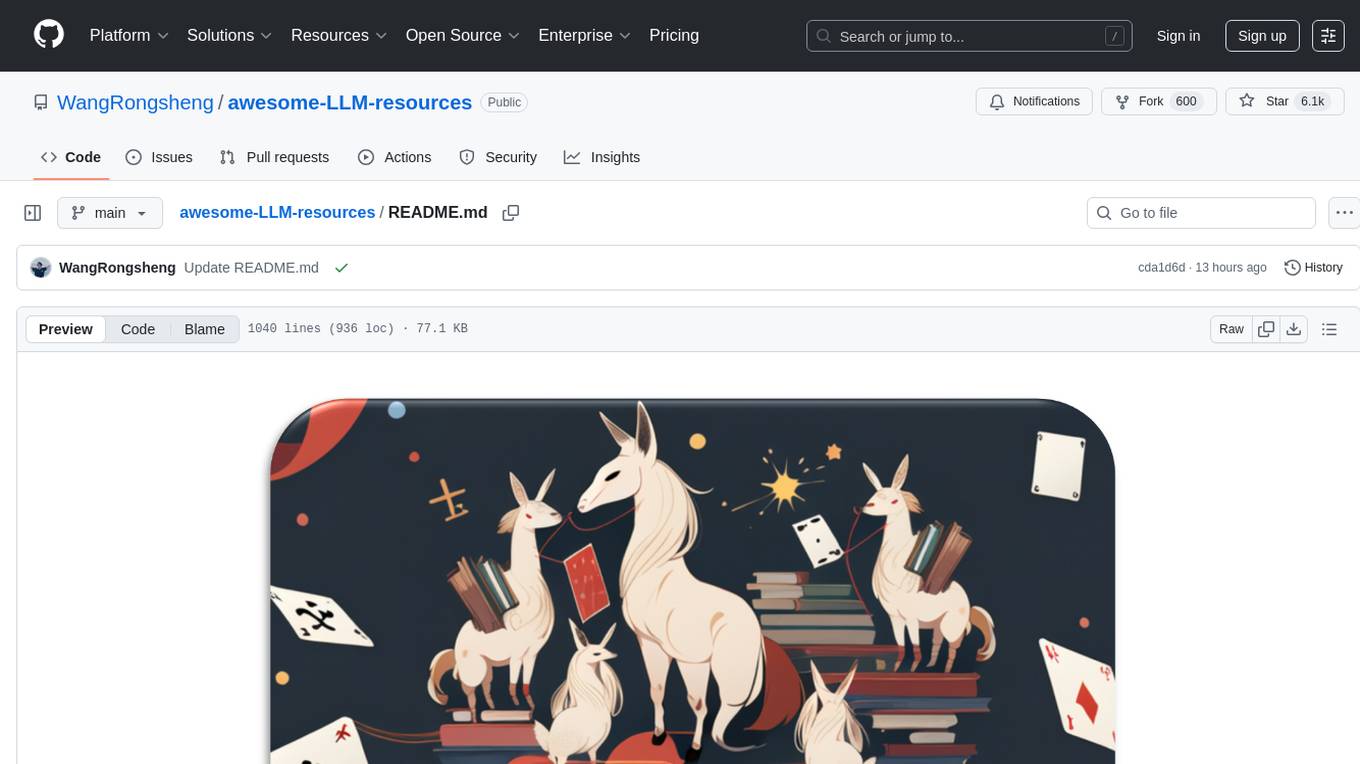
awesome-LLM-resources
This repository is a curated list of resources for learning and working with Large Language Models (LLMs). It includes a collection of articles, tutorials, tools, datasets, and research papers related to LLMs such as GPT-3, BERT, and Transformer models. Whether you are a researcher, developer, or enthusiast interested in natural language processing and artificial intelligence, this repository provides valuable resources to help you understand, implement, and experiment with LLMs.
For similar tasks
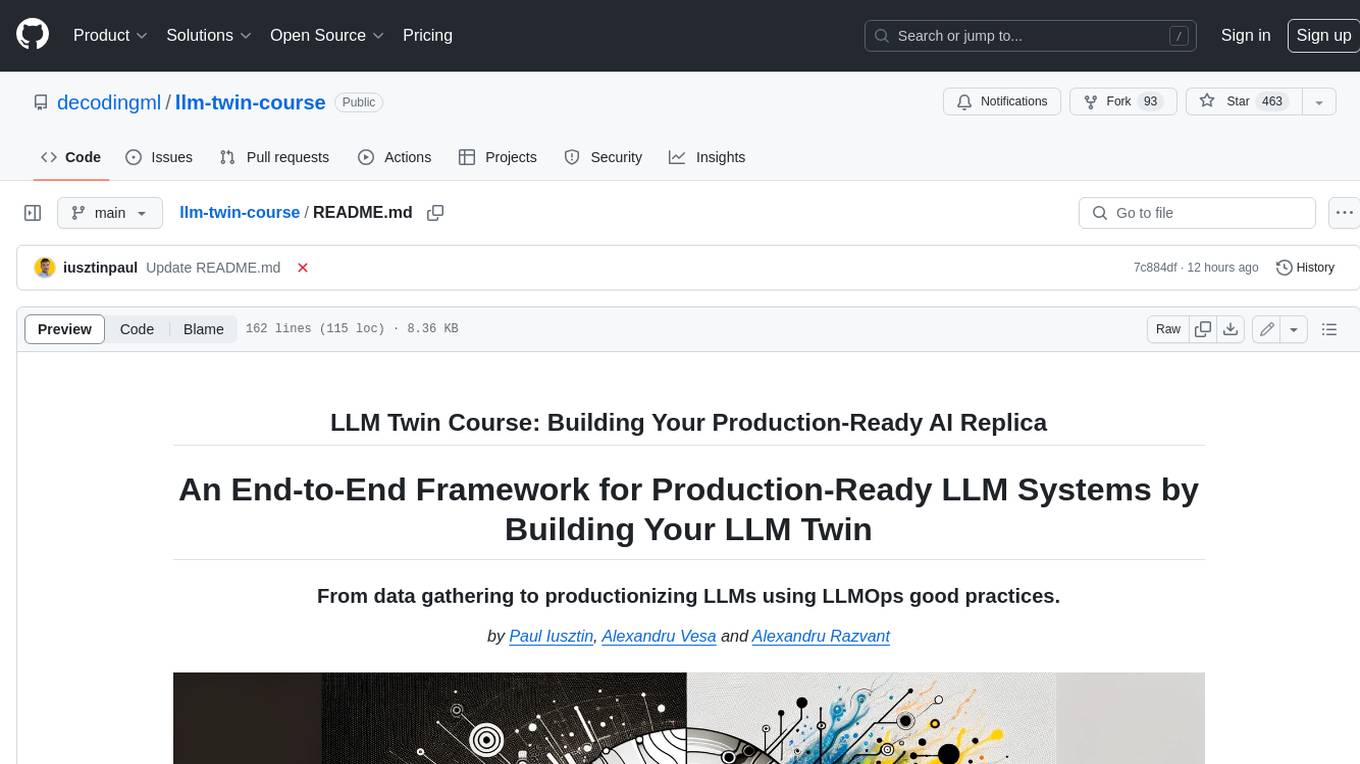
llm-twin-course
The LLM Twin Course is a free, end-to-end framework for building production-ready LLM systems. It teaches you how to design, train, and deploy a production-ready LLM twin of yourself powered by LLMs, vector DBs, and LLMOps good practices. The course is split into 11 hands-on written lessons and the open-source code you can access on GitHub. You can read everything and try out the code at your own pace.

Agent
Agent is a RustSBI specialized domain knowledge quiz LLM tool that extracts domain knowledge from various sources such as Rust Documentation, RISC-V Documentation, Bouffalo Docs, Bouffalo SDK, and Xiangshan Docs. It also provides resources for LLM prompt engineering and RAG engineering, including guides and existing projects related to retrieval-augmented generation (RAG) systems.
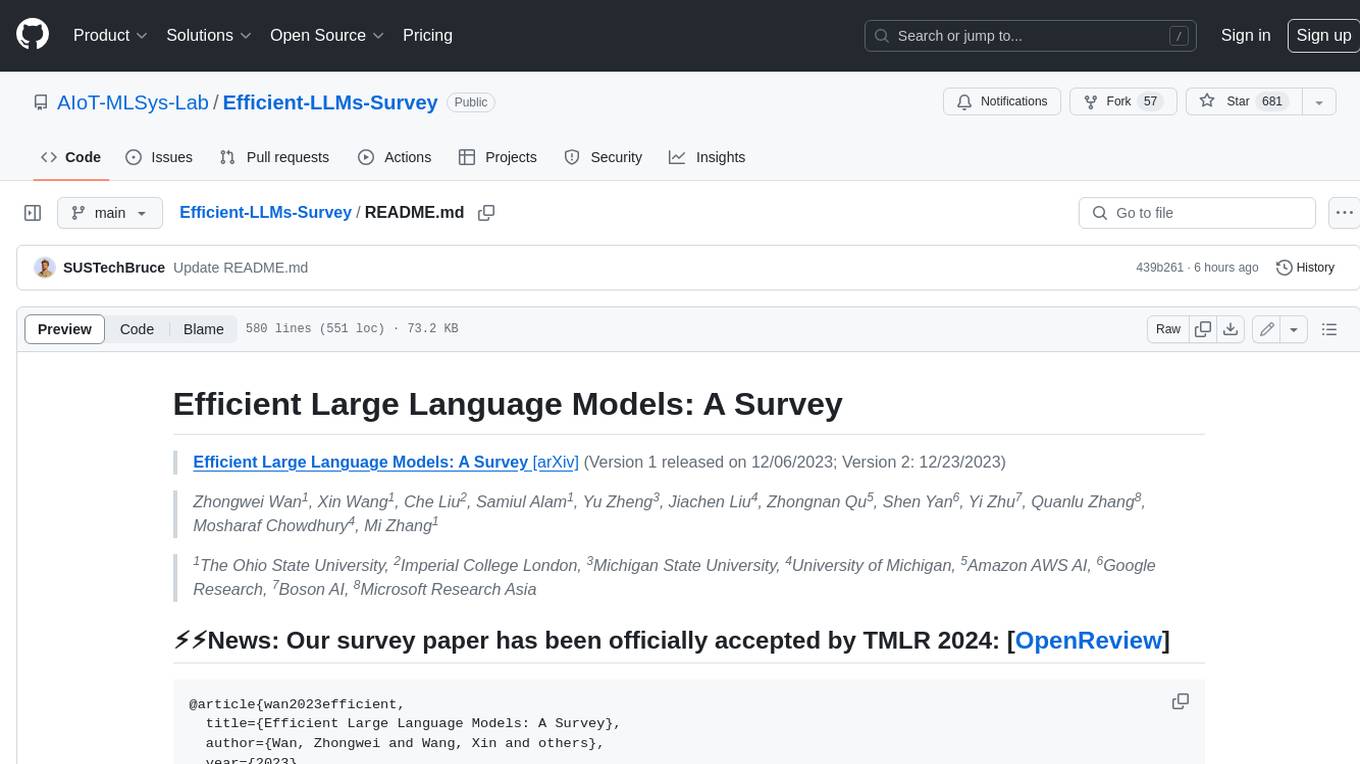
Efficient-LLMs-Survey
This repository provides a systematic and comprehensive review of efficient LLMs research. We organize the literature in a taxonomy consisting of three main categories, covering distinct yet interconnected efficient LLMs topics from **model-centric** , **data-centric** , and **framework-centric** perspective, respectively. We hope our survey and this GitHub repository can serve as valuable resources to help researchers and practitioners gain a systematic understanding of the research developments in efficient LLMs and inspire them to contribute to this important and exciting field.
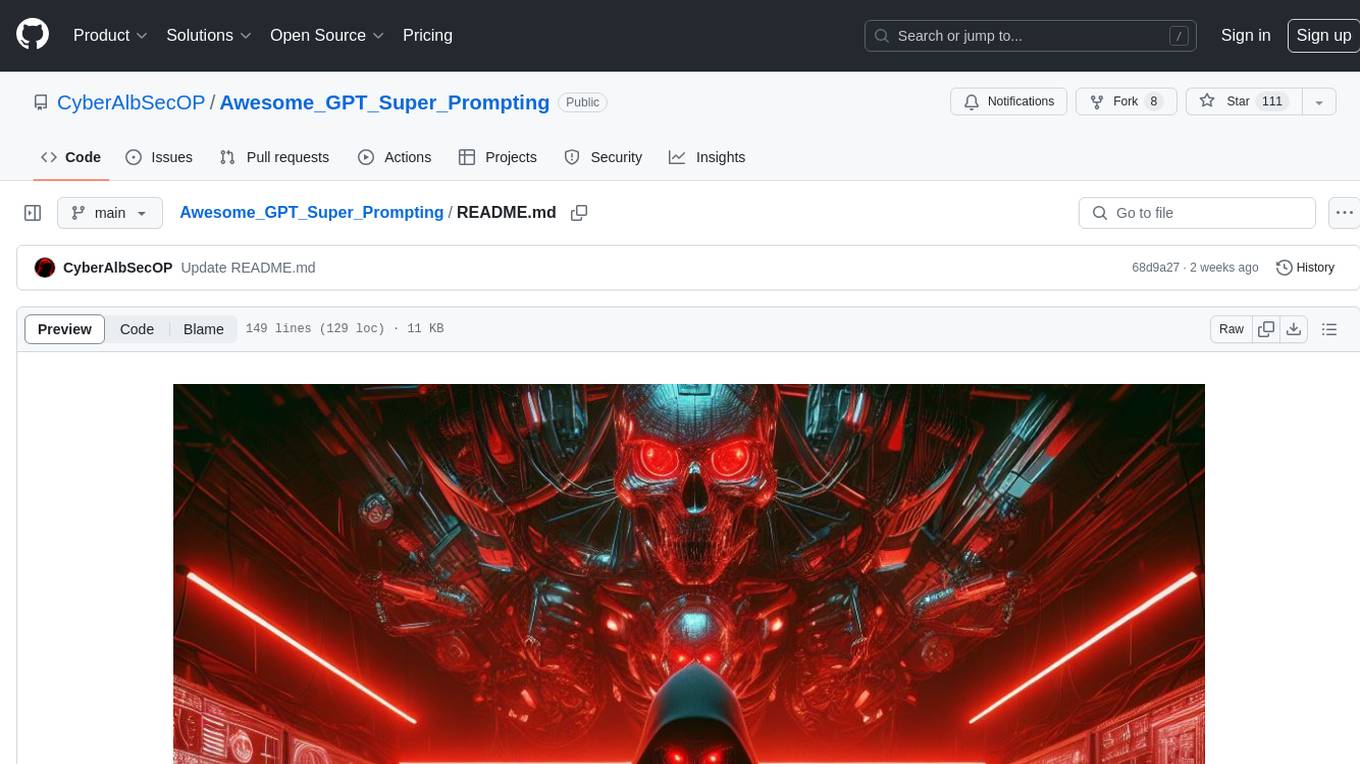
Awesome_GPT_Super_Prompting
Awesome_GPT_Super_Prompting is a repository that provides resources related to Jailbreaks, Leaks, Injections, Libraries, Attack, Defense, and Prompt Engineering. It includes information on ChatGPT Jailbreaks, GPT Assistants Prompt Leaks, GPTs Prompt Injection, LLM Prompt Security, Super Prompts, Prompt Hack, Prompt Security, Ai Prompt Engineering, and Adversarial Machine Learning. The repository contains curated lists of repositories, tools, and resources related to GPTs, prompt engineering, prompt libraries, and secure prompting. It also offers insights into Cyber-Albsecop GPT Agents and Super Prompts for custom GPT usage.
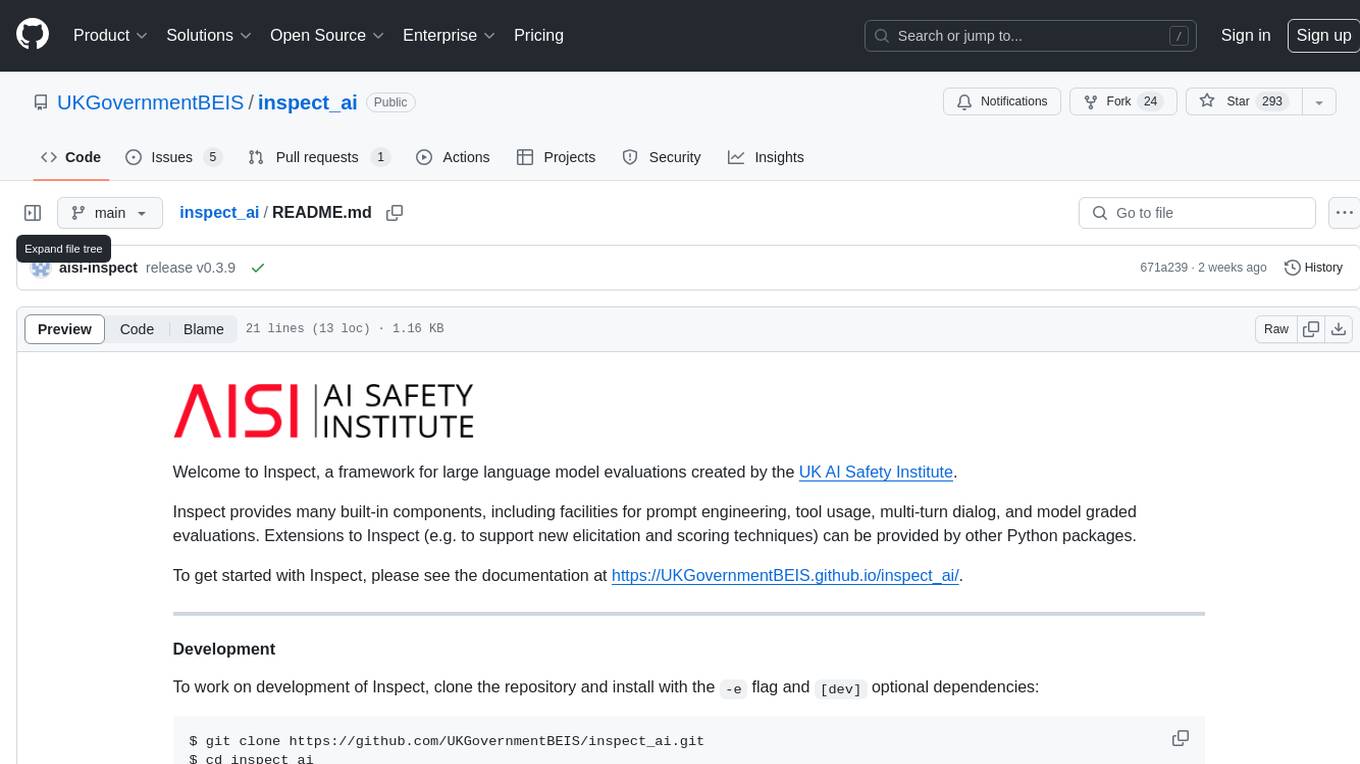
inspect_ai
Inspect AI is a framework developed by the UK AI Safety Institute for evaluating large language models. It offers various built-in components for prompt engineering, tool usage, multi-turn dialog, and model graded evaluations. Users can extend Inspect by adding new elicitation and scoring techniques through additional Python packages. The tool aims to provide a comprehensive solution for assessing the performance and safety of language models.
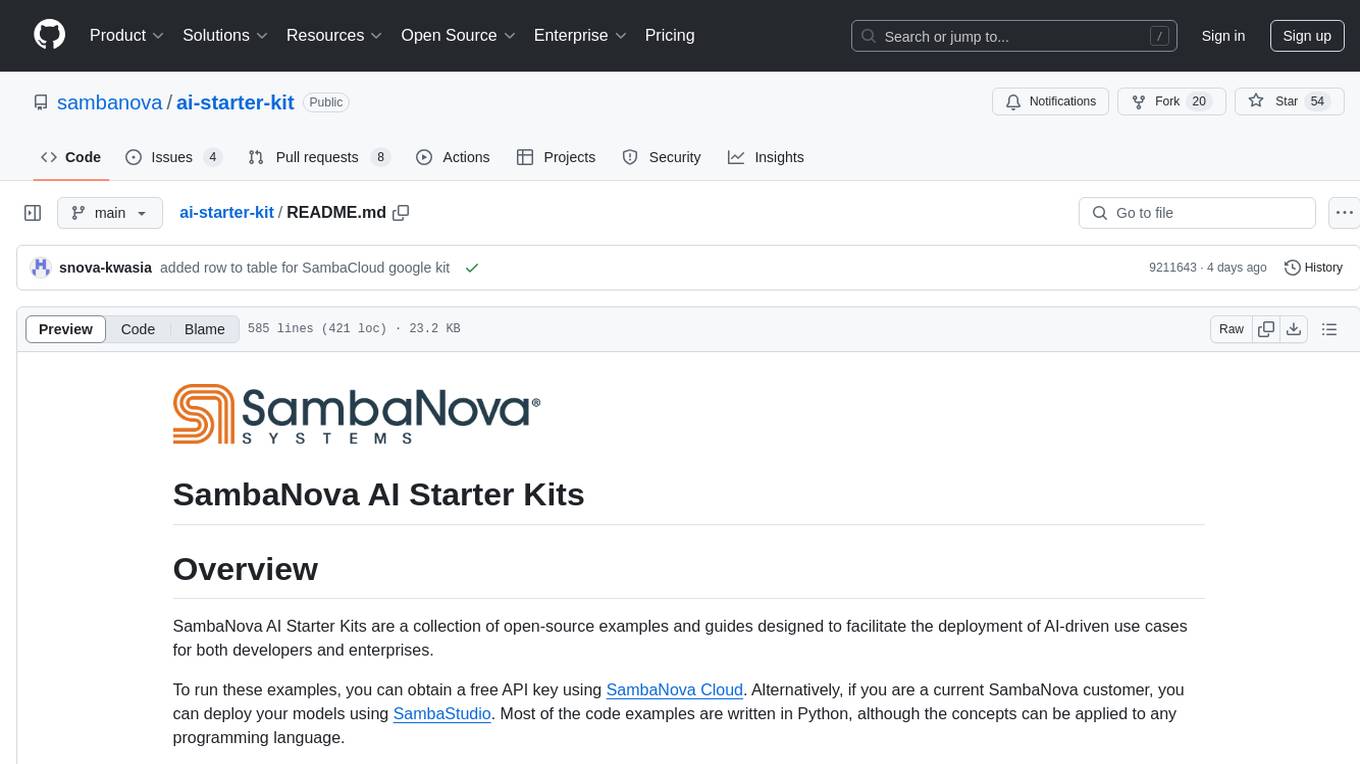
ai-starter-kit
SambaNova AI Starter Kits is a collection of open-source examples and guides designed to facilitate the deployment of AI-driven use cases for developers and enterprises. The kits cover various categories such as Data Ingestion & Preparation, Model Development & Optimization, Intelligent Information Retrieval, and Advanced AI Capabilities. Users can obtain a free API key using SambaNova Cloud or deploy models using SambaStudio. Most examples are written in Python but can be applied to any programming language. The kits provide resources for tasks like text extraction, fine-tuning embeddings, prompt engineering, question-answering, image search, post-call analysis, and more.
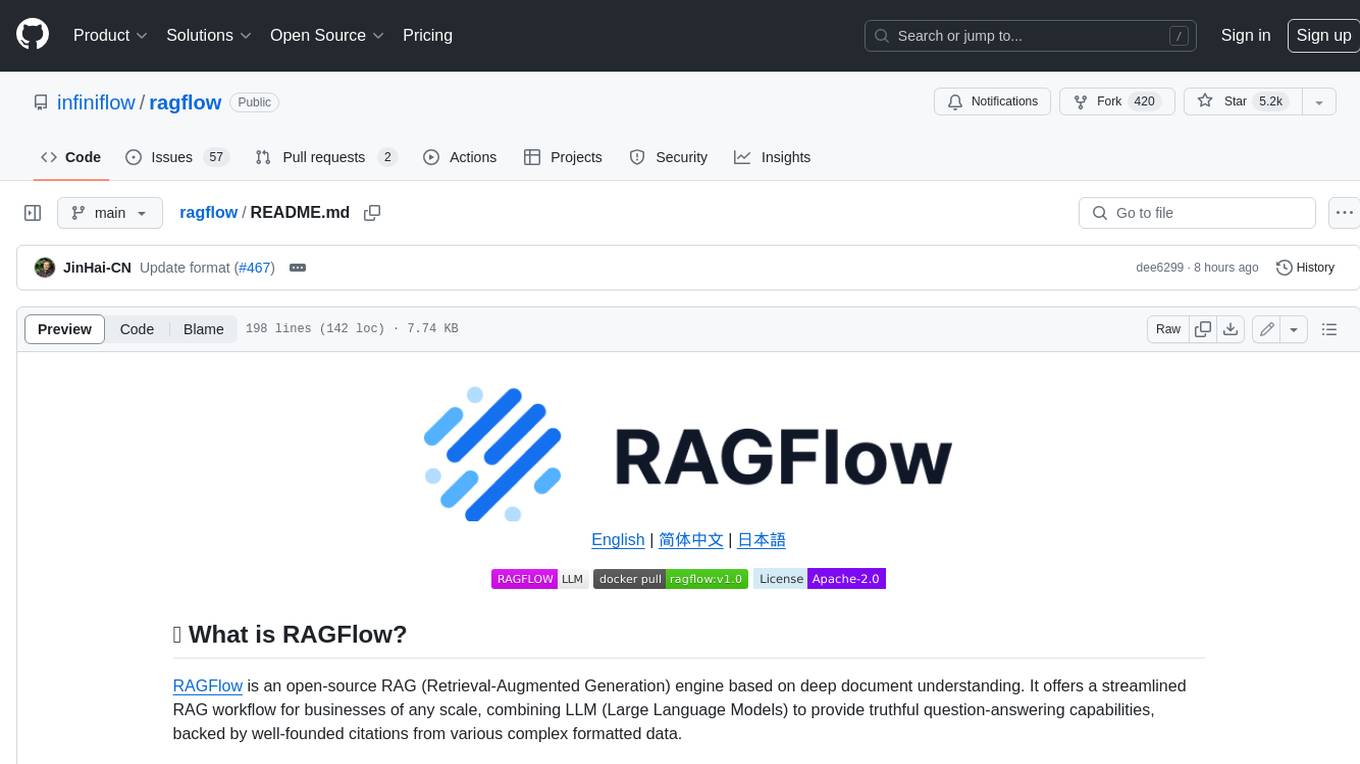
ragflow
RAGFlow is an open-source Retrieval-Augmented Generation (RAG) engine that combines deep document understanding with Large Language Models (LLMs) to provide accurate question-answering capabilities. It offers a streamlined RAG workflow for businesses of all sizes, enabling them to extract knowledge from unstructured data in various formats, including Word documents, slides, Excel files, images, and more. RAGFlow's key features include deep document understanding, template-based chunking, grounded citations with reduced hallucinations, compatibility with heterogeneous data sources, and an automated and effortless RAG workflow. It supports multiple recall paired with fused re-ranking, configurable LLMs and embedding models, and intuitive APIs for seamless integration with business applications.
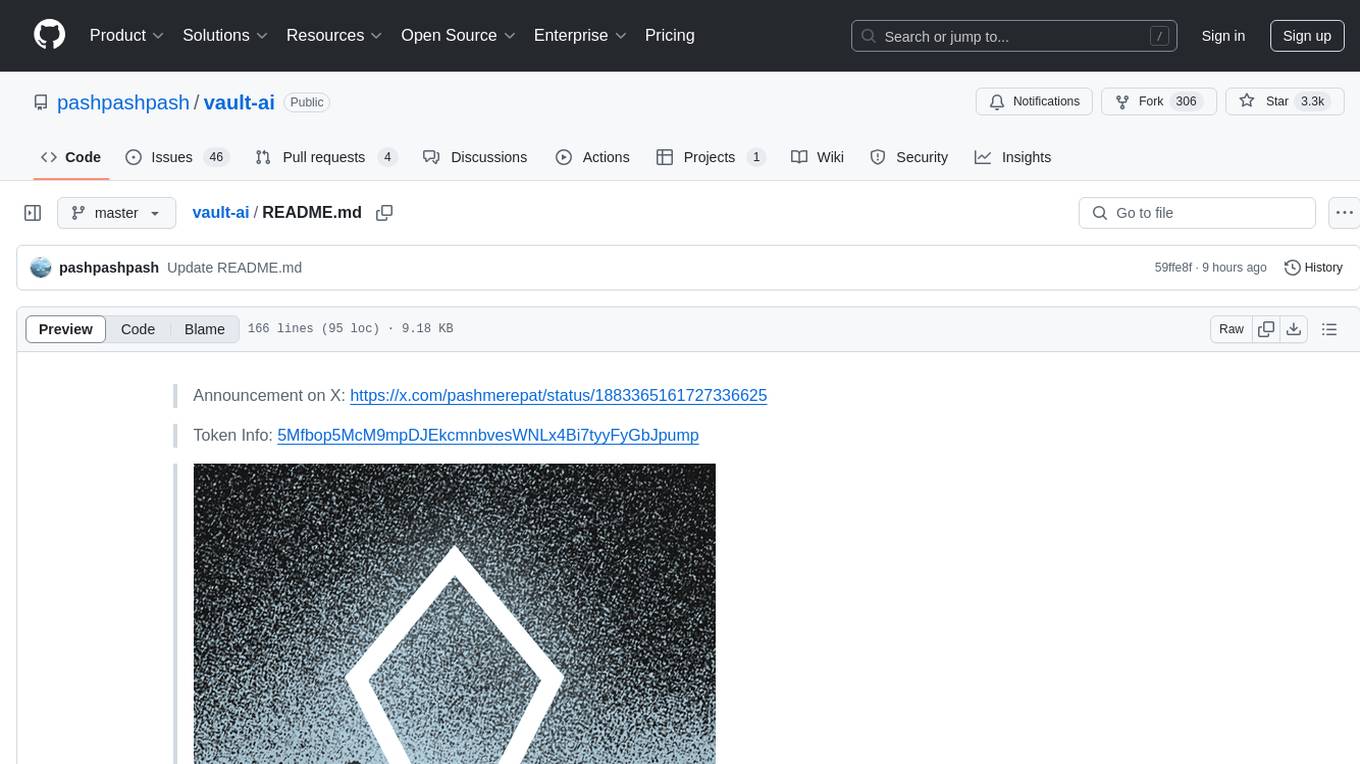
vault-ai
OP Vault is a tool that leverages the OP Stack (OpenAI + Pinecone Vector Database) to allow users to upload custom knowledgebase files and ask questions about their contents. It provides a user-friendly Golang server and React frontend for querying human-readable content like books and documents, making it valuable for knowledge extraction and question-answering. Users can upload entire libraries, receive specific answers with file and section references, and explore the power of the OP Stack in a practical interface.
For similar jobs

sweep
Sweep is an AI junior developer that turns bugs and feature requests into code changes. It automatically handles developer experience improvements like adding type hints and improving test coverage.

teams-ai
The Teams AI Library is a software development kit (SDK) that helps developers create bots that can interact with Teams and Microsoft 365 applications. It is built on top of the Bot Framework SDK and simplifies the process of developing bots that interact with Teams' artificial intelligence capabilities. The SDK is available for JavaScript/TypeScript, .NET, and Python.

ai-guide
This guide is dedicated to Large Language Models (LLMs) that you can run on your home computer. It assumes your PC is a lower-end, non-gaming setup.

classifai
Supercharge WordPress Content Workflows and Engagement with Artificial Intelligence. Tap into leading cloud-based services like OpenAI, Microsoft Azure AI, Google Gemini and IBM Watson to augment your WordPress-powered websites. Publish content faster while improving SEO performance and increasing audience engagement. ClassifAI integrates Artificial Intelligence and Machine Learning technologies to lighten your workload and eliminate tedious tasks, giving you more time to create original content that matters.

chatbot-ui
Chatbot UI is an open-source AI chat app that allows users to create and deploy their own AI chatbots. It is easy to use and can be customized to fit any need. Chatbot UI is perfect for businesses, developers, and anyone who wants to create a chatbot.

BricksLLM
BricksLLM is a cloud native AI gateway written in Go. Currently, it provides native support for OpenAI, Anthropic, Azure OpenAI and vLLM. BricksLLM aims to provide enterprise level infrastructure that can power any LLM production use cases. Here are some use cases for BricksLLM: * Set LLM usage limits for users on different pricing tiers * Track LLM usage on a per user and per organization basis * Block or redact requests containing PIIs * Improve LLM reliability with failovers, retries and caching * Distribute API keys with rate limits and cost limits for internal development/production use cases * Distribute API keys with rate limits and cost limits for students

uAgents
uAgents is a Python library developed by Fetch.ai that allows for the creation of autonomous AI agents. These agents can perform various tasks on a schedule or take action on various events. uAgents are easy to create and manage, and they are connected to a fast-growing network of other uAgents. They are also secure, with cryptographically secured messages and wallets.

griptape
Griptape is a modular Python framework for building AI-powered applications that securely connect to your enterprise data and APIs. It offers developers the ability to maintain control and flexibility at every step. Griptape's core components include Structures (Agents, Pipelines, and Workflows), Tasks, Tools, Memory (Conversation Memory, Task Memory, and Meta Memory), Drivers (Prompt and Embedding Drivers, Vector Store Drivers, Image Generation Drivers, Image Query Drivers, SQL Drivers, Web Scraper Drivers, and Conversation Memory Drivers), Engines (Query Engines, Extraction Engines, Summary Engines, Image Generation Engines, and Image Query Engines), and additional components (Rulesets, Loaders, Artifacts, Chunkers, and Tokenizers). Griptape enables developers to create AI-powered applications with ease and efficiency.